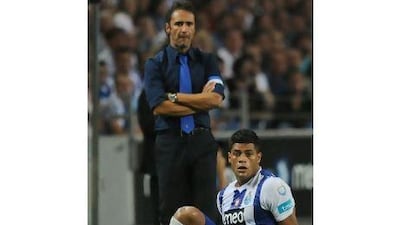Neither of the teams lining up for tonight's European Super Cup need to ask directions to Monaco's Louis II stadium.
Porto and Barcelona have appeared in this curtain-raiser to the European competitions season three times each in the last eight years, so their supporters know the walk through Monte Carlo, past the conference centre where the executives of Europe's biggest clubs have since yesterday been attending the draws for the Champions League and Europa League and, in hotel lobbies, arranging transfer deals ahead of Wednesday's deadline.
In this respect, Porto have been busy. The interest shown by Chelsea in signing the Uruguayan wing-back Alvaro Pereira was intensifying yesterday and, with a move seeming likely, the player was excluded from the squad for tonight.
His absence will be one of the big differences between the likely line-up against Barca and the Porto team that won the Europa League.
That is usually the case with Portugal's most successful side of the new century.
Each of the three major trophies collected by Porto - the 2003 Uefa Cup, the 2004 Champions League, the 2011 Europa League - have been followed by departures of senior staff, usually at great financial profit to a club with a firm belief in their ability and replace departing talent.
When a Porto squad coached by a young Jose Mourinho turned up in Monaco eight Augusts ago to face AC Milan in the Super Cup, it was at the end of a summer where Mourinho had needed to persuade Jorge Pinto da Costa, the club president, not to immediately capitalise on the growing reputations of certain players.
The winger Nuno Capucho had moved to Glasgow Rangers but otherwise Mourinho's close relationship with his team would be maintained for another 12 months: they had earned another Super Cup date by the following August, having won the Champions League.
Then they emigrated en masse. Mourinho promptly joined Chelsea, taking with him Ricardo Carvalho and Paulo Ferreira. Deco moved to Barcelona. Selling those three players brought in more than €70 million (Dh371m) to Porto.
The new cycle of talent-spotting and development took a while to raise the club again to pre-eminence, even domestically, but a remarkable 2010/11 campaign was underpinned by familiar strategies: key players imported from South America; a young head coach. Under Andre Villas Boas Porto achieved an unbeaten record in the league to go alongside their Europa League victory.
Villas Boas has now joined Chelsea, just like Mourinho once did, only this time Pinto da Costa gained €15m in compensation for the loss of the 33-year-old.
"Porto have had many great coaches who have won European titles, like Artur Jorge [who won the 1987 European Cup for the club] and Jose Mourinho and there will be more," Pinto da Costa said.
The next in the line may yet be Vitor Pereira, promoted from No 2 under Villas Boas last season to full charge. He would certainly hope his succession, post Villas Boas, proves more straightforward than the immediate post-Mourinho period of Porto's history.
In the 2004 Super Cup, Porto's head coach was the newly appointed Italian Gigi Del Neri. By mid-September, Del Neri had left. Vitor Pereira is 43, this is his first senior head coaching job and, like Mourinho and Villas Boas, he had an unremarkable playing career.
Under him, Porto have won all three competitive matches so far, including the domestic Super Cup. But beating Barcelona is a tougher challenge.
A footballer like Pereira, quick, intelligent and energetic down the left flank, is bound to be missed and the departure of Radamel Falcao, the leading goalscorer in the 2010/11 Europa League, and now at Atletico Madrid leaves a gap in attack.
Pinto da Costa negotiated a mammoth €40m for the Colombian striker's sale.
"This is going to be a harder season for us," Vitor Pereira told reporters, "because opponents are wiser to the way we play."
Barcelona, who can expect to have most of the possession, as is their custom and could give a first competitive start to Cesc Fabregas, will know enough about Porto to be wary of their threat on the counter-attack, their menace at set pieces and that, even without Falcao, the thunderbolt left foot of the Brazilian striker Hulk is a significant weapon.


